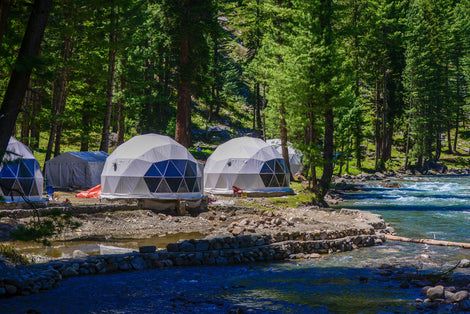Power Storage Performance in Different Weather
Power storage is a big part of keeping any off-grid solar setup running. Without solid backup, even the best solar kit can leave you without power when the sun isn’t shining. Whether you’re running a few lights and a fridge or an entire cabin with heating and appliances, good storage keeps things steady when the skies don’t cooperate.
But what happens when the weather changes? Cold winters, hot summers, heavy rain, or dry heat can all affect battery life and performance. That’s why it’s smart to think through how your system handles different conditions. From overworked inverters to shortened lifespans, changing temperatures can throw off your setup if you’re not prepared. Here’s how weather impacts your battery performance and what you can do about it, especially if you’re using one like the Epoch battery that’s built with off-grid living in mind.
Weather Impacts On Power Storage
Weather plays a much bigger role in battery behavior than most people realize. While solar panels tend to do fine across a wide range of seasons, batteries can get picky. The main elements that mess with performance are extreme temperatures, moisture, and changes in air pressure.
Here’s how different types of weather can affect your battery system:
1. Cold conditions
- Lower temperatures slow chemical reactions in batteries, which means less power output.
- Charging can also become tricky. Charging a cold battery might damage it or cut into its lifespan.
- Off-grid systems may drain faster in winter if you’re using heaters, running more lights, or if daylight hours are shorter.
2. Hot weather
- When it’s too hot, things speed up quickly. This can cause overheating or swelling in some battery types.
- High temperatures can shorten the battery’s overall lifespan and force it to work harder to stay balanced.
3. Humidity and rain
- If battery enclosures aren’t properly sealed, moisture can sneak in and corrode the internal connections.
- Damp environments raise the risk of electrical shorts, which can damage your gear or leave you without power.
4. Dry climates
- Dust and debris are more common in dry regions. These can work their way into vents and make cooling less efficient.
- Without proper airflow, heat builds up faster, which makes batteries less stable.
To keep things steady, some battery models like the Epoch battery are designed to handle these fluctuations better than older styles. Built-in temperature regulation, moisture control, and protective cases help push through tough weather without losing performance. Still, no battery is completely weatherproof. You get a lot more out of your system when you take a few extra steps with weather in mind.
Optimizing Power Storage For Various Weather
Once you understand how weather affects your storage system, the next move is to stay one step ahead of those changes. A few smart habits and some added equipment can go a long way in helping your batteries last longer and perform better.
Here are some ways to protect and extend battery life during different weather patterns:
- Add insulation
Cold temps suck the power out fast. Wrapping your battery housing in insulation helps it hold a more stable temperature, especially during freezing nights.
- Shade your battery bank
Heat can be just as damaging. Install your batteries in a shaded spot or under a cover to keep direct sunlight off the case.
- Use sealed enclosures
Rain and humidity can sneak into battery spaces. A water-resistant or sealed battery box keeps damp air and moisture from frying your system.
- Vent properly
In both wet and dry weather, good airflow matters. Add vents with filters to keep dust and water out but still let heat escape.
- Add a battery heater or cooler if needed
Some climates call for extra help. Small heating pads or fans can make a difference for systems in extreme spots.
Regular checks and some planning help batteries from losing power or wearing out too fast. Think of it like storing food in your kitchen. Leave it in the sun or out in the cold, and it won’t last. Store it right, and it stays useful longer. It’s the same with your solar batteries, especially if you're relying daily on power you can't afford to lose.
Seasonal Maintenance Tips
If you’re using off-grid solar kits year-round, it's smart to get into seasonal habits to keep your battery storage running smoothly. A few quick adjustments throughout the year can prevent you from running into bigger problems when the weather turns.
Start with summer. Heat puts batteries under heavy stress. Check on your system more often during heat waves. Even models like the Epoch battery that offer high durability will still benefit from a check-up. Clear out dust from vents, reposition any shading, and double-check that your cooling setup is doing its job. If you notice any signs of swelling or unexpected drops in performance, act fast.
In winter, freezing temperatures can slow your battery’s power delivery and complicate charging. Avoid charging if the battery is below freezing. If possible, use enclosures that provide insulation or built-in heat support. Watch for signs of low performance, like lights dimming faster than usual or your system shutting off early.
During rainy seasons or in places with high humidity, moisture becomes the main concern. Once water finds its way into battery terminals, it can lead to rust, short-circuits, or even system failure. Make sure enclosures are sealed and raised above ground level, especially if your area is prone to flooding or standing water.
Here’s a simple seasonal checklist to follow:
- Inspect all wires and terminals at the start of each season
- Wipe down the battery housing and keep the area clean of debris
- Test airflow in the battery compartment to prevent overheating
- Check the charge/discharge efficiency monthly in extreme seasons
- Clear any filters or vents that keep moisture and dust out
The solution isn’t expensive gear or complicated setups. It’s just consistent care. A quick glance each season helps avoid those power cuts when you need electricity most, like during a snowstorm or heatwave.
Importance Of Choosing The Right Battery
When it comes to off-grid power storage, the battery you pick matters a lot more than it seems. It’s the part that holds everything together when your solar inputs drop. So if a storm rolls through or the days get short, you rely on that battery to keep things steady without switching everything off.
Batteries like Epoch are built for abuse. They're made to endure changing environments without dropping performance right away. That makes them a better match for year-round setups where the weather isn't always predictable. Some low-grade batteries lose charge fast, can't handle recharging properly in cold weather, or degrade quicker when it gets too hot. None of this is helpful if your daily life depends on off-grid power.
When looking for a good battery for your off-grid kit, consider:
- Temperature tolerance range
- Dust and water resistance
- Number of recharge cycles before performance drops
- Built-in features that regulate thermal conditions
All of these factors come into play when your system is tested by the seasons. For homeowners who’ve dealt with outages or system damage from weather, the benefits of using better batteries become clear. One user in the desert southwest noticed their older battery gear kept overheating and failing every summer. After switching to a battery with a heat-resistant design, their recharge rate stayed normal and the unexpected shutoffs stopped.
The battery isn’t just a backup. It’s part of the whole power plan. If it can’t perform when things get extreme, then your system can’t either.
Keeping Your Power Ready in Every Season
Living off-grid gives you freedom, but that freedom works best with a bit of routine. Weather can flip fast, and your solar setup won’t always enjoy cloudless skies. That’s why it pays to build habits around battery maintenance and weather-proofing throughout the year.
A solid solar kit can't do the job without a dependable storage unit. If the battery fails, your power goes with it. Following a seasonal care schedule, setting the battery up in the right place, and investing in smart features made for tough climates can help avoid those issues. Taking quick action like shielding your units, managing airflow, or even keeping the battery a few degrees more stable can make a noticeable difference in uptime.
Most off-grid problems aren’t hard to fix, they just show up when you’re least ready for them. By learning how your battery handles seasons, checking in before the temperatures swing too far, and adjusting your setup as needed, you give yourself the best chance at staying powered year-round.
Learn More About Power Storage Options
To find products and support that can help you protect your off-grid solar investment, visit Green Vista Living and explore our range of solar power storage options built for year-round performance.
For those ready to ensure their off-grid solar systems operate smoothly through any season, exploring the benefits of the Epoch battery can help you stay powered through every shift in weather. Green Vista Living offers solar kits designed to handle the demands of off-grid living, giving you reliable energy whether it's hot, cold, rainy, or dry.







